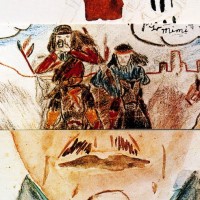John Lennon might not recognize the dissipated, agonizing figure heard howling for lost love here. After all, he subsequently reunited with that lost love, had a son, quit the business for five years during the late 1970s then returned with some of the most melodic, contented sounds of his solo career.
All of that ends up giving greater weight to a complex earlier tune like “Nobody Loves You (When You’re Down and Out),” released on Sept. 26, 1974 as part of Walls and Bridges. It’s a key moment on an aptly titled album, a song that stands as one of the more memorable indictments on rock music’s curious tendency toward necrophilia.
Exiled on the other side of the country during a separation from wife Yoko Ono and New York City, John Lennon was living an existential L.A. life. “She wouldn’t let me come home,” Lennon told David Sheff in 1980. “So what do you say? OK, back to the bottle.” Alone now with his thoughts, Lennon finally and completely opened himself to an elemental fear of isolation that he once angrily confronted on his first proper solo release, Plastic Ono Band in 1970.
Through versions released on 1986’s posthumous Menlove Ave. and then the sprawling 1998 Anthology, we see how the tune evolves toward a moment on the completed Walls and Bridges of brutal honesty about separation and longing. There is none of the closed-fist bravado that marked Lennon’s recordings of five years before. Instead, he submits to the roiling emotions sparked by the loss of his father (who abandoned him as a child) and mother (who was killed in a traffic accident), and then his band (you may have heard about this one), and then his home life.
“Everybody’s hustling for a buck and a dime; I scratch your back and you scratch mine,” he sings. “… All I can tell you is, it’s all show biz.” Later, during the second iteration of this lyric, Lennon adds: “I’ll scratch your back, and you knife mine.”
Eventually, Lennon reunited with Yoko Ono. In quick succession over the course of a matter of days in 1975, the former Beatles star was blessed with the birth of son Sean (on Lennon’s 35th birthday, no less) and news that long-standing immigration problems over his move to America had been resolved. He disappeared into parenting and househusbandry, aware it seemed for the first time (as he eventually sang on the 1980 comeback album Double Fantasy) that “life is what happens to you when you’re busy making other plans.”
Lennon was in the midst of an embryonic creative rebirth by then. Sessions from 1979-80, still in progress when he was murdered, sparked enough magic for a follow up, 1983’s Milk and Honey – an assortment of unfinished gems, including a final solo charting single in “Nobody Told Me.” They also worked as the template for one last Beatles session, when Paul McCartney, George Harrison and Ringo Starr reconvened in the mid-1990s to complete two Lennon tracks, “Free As a Bird” and “Real Love.”
Underscoring the sad irony of Lennon’s stated theme on “Nobody Loves You (When You’re Down and Out),” where a broken-down musician laments his latter-day role outside the circle of fame: Decades without John Lennon have done nothing to dull his influence on rock music (from the Smashing Pumpkins to Grant Lee Phillips to the doomed Kurt Cobain) and less even still to soften the cutting wit found on still largely undiscovered album tracks like “Nobody Loves You.”
These days, too many people overlook the Walls and Bridges album because of its period-piece studio tricks. Yet John Lennon remains in complete control of a lyric. I’m still struck by Lennon’s willingness to strip himself bare. He’s just as hard on himself as he is on everybody else.
Finally, in a harrowing moment on this tune, he admits: “Everybody loves you when you’re six foot in the ground.” Not without moments like these.
- The Bright Spots in George Harrison’s Troubled ‘Dark Horse’ Era - December 29, 2024
- The Pink Floyd Deep Cut That Perfectly Encapsulates ‘The Wall’ - November 29, 2024
- Why Pink Floyd’s ‘The Endless River’ Provided a Perfect Ending - November 11, 2024



